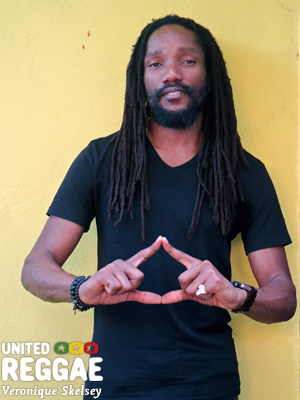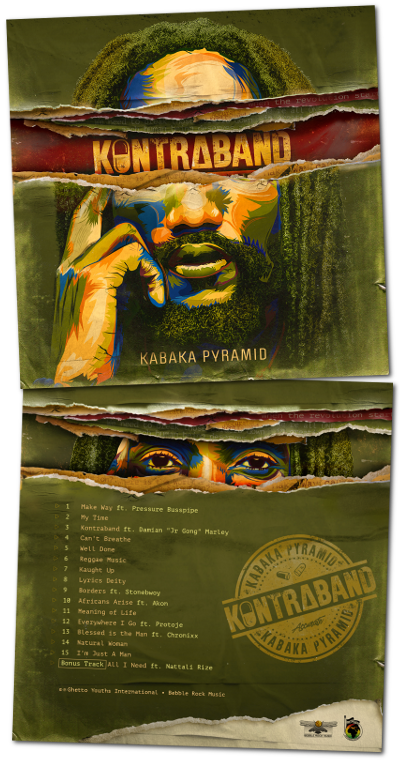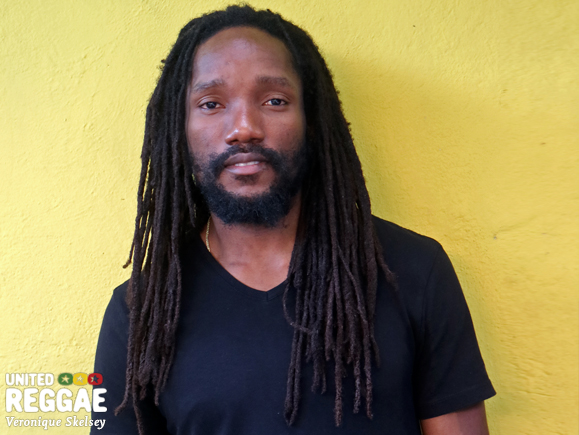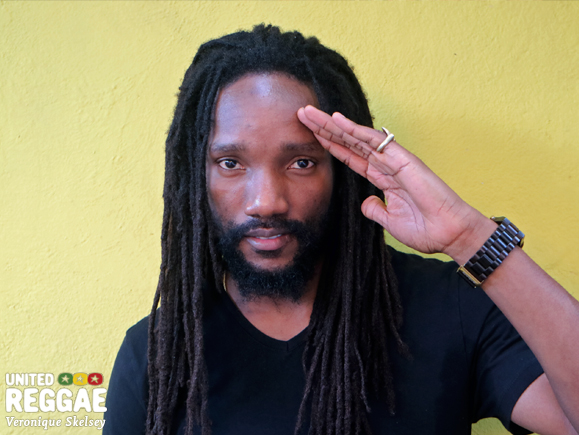Articles about reggae music, reviews, interviews, reports and more...
Interview: Kabaka Pyramid at Bob Marley Museum
- Home
- Articles
- Interviews
- Interview: Kabaka Pyramid at Bob Marley Museum

Interview: Kabaka Pyramid at Bob Marley Museum
"Each life presents us with new opportunities"
Sampler
Specialist lyricist Kabaka Pyramid finally releases his long awaited first official album Kontraband on May 25th. Co-produced by Damian Junior Gong Marley (sourcing rhythms from a variety of beatmakers) Kontraband has been in gestation for the last 2 years with its track-list changing behind the scenes all the while.
Singles Can’t Breathe, Borders featuring Stonebwoy, and Kaught Up suggest Kabaka fans can expect his customary lyrical prowess, Rasta informed philosophy and social commentary. Yet Kabaka has also hinted in interviews that we will hear some more personal, vulnerable sides to his music and personality which may surprise…
Angus Taylor sat down with Kabaka on Bob Marley’s birthday at the Marley family home on 56 Hope Road Kingston, Jamaica. As reggae fans from the island and around the world gathered to celebrate the Tuff Gong’s 73rd year, the following interview was being conducted in a special private room filled with Marley motorcycles.
Kabaka had just come from Miami where he and Damian were approximately 85% of the way through Kontraband. He was preparing to go into rehearsals for a BBC 1xtra session with Seani B. He was concerned for the future of his beloved Arsenal football club – correctly predicting the departure of manager Arsene Wenger last week.
They talked about immigration, reincarnation, the controversy over Damian Marley beating Chronixx in this year’s Grammys and much more. Kabaka also revealed the working tracklist for the album and confirmed that Chronixx, Protoje, Nattali Rize and Damian will appear as guests...
Thanks for holding this interview in this very special place.
For sure. We are at the museum and the property of the Marley family right now. When Damian and Stephen come to Jamaica this is where they stay - so it’s good to know that the legacy is still maintained and carried on. Donisha [Prendergast] who is a friend since high school days, allowed us to utilise the space and we give thanks.
As you walked into the museum grounds I noticed you greeted the great percussionist Bongo Herman.
You saw that? (Laughs) Bongo is a real general. Obviously most people who are in tune with reggae know about Bongo Herman and all the great works he did over the years, including Bob Marley and the Wailers material, Satta Massagana and all of them. As an artist I always have good vibes with him and reasoning. He can teach you a lot still. He even offered me a track. I wanted to sample one of his tracks once and he gave me the full permission. It never worked out in the end but at least you know the elders are supporting the youth doing the music.
When United Reggae last interviewed you in Jamaica in February 2015 you were playing literally dozens of gigs for Reggae Month. You were everywhere. This year you’re more established and taking it comparatively easy…
(Laughs) What I love about Reggae Month is it’s a great platform for exposure. My management team are a big part of JARIA so they are the ones that make things happen a certain way especially around Reggae Month and ensure upcoming artists get a certain amount of input. So when I was up and coming I would always have that as a platform. I would perform like every other year and I definitely took advantage of that for sure!
Now there are a lot of smaller scale events that take place, but there aren’t that many big festivals. We would love it if we could have a lot of the big Jamaican festivals happening in February. Because you have the Bob Marley show down at Trench Town which gets huge crowds but it’s pretty much local people in that specific area of Kingston. So we want to have some of the big shows like Sumfest level, Rebel Salute level in February. That would be great.
Are you happy with how your music is progressing right now?
For sure. In life you just have to give thanks and know that you’re putting in the work and you get what you deserve out based on the work that you put in. That’s what I believe still. To be touring every single year, that I can live and survive off of music, for me that alone is a success. Because we come from Jamaica where people with degrees can’t get jobs so we know how rough life can be. So to know I have a big team around me and we can represent the music in the right way, working with the Marley family, closely with people like Chronixx, Protoje Jesse Royal, who give me constant inspiration and motivation, there’s no reason to not be happy.

Not at that time. What happened was I reached out to my social media following and asked which African artist they wanted to see me collaborate with and Stonebwoy’s name came up the most by far. I checked his Twitter and realised he was following me and I was following him! So I thought “I’ll just hail him and say “We haffi mek some music”’ and the man was like “Sure! I’m working on my album - I’ll send you a track”.
He sent me the Suit and Tie song, I recorded on it within a couple of weeks and he loved it. He put out the album in December and I told him “I have this track about the refugee situation”. I saw an article saying he is actually an ambassador for the UN for refugees, so it definitely seemed like the right thing. I reached out to him again and within a matter of weeks we got back the verse. We loved it. It’s a verse that grows on you more and more. Every time we were in the studio Damian would be singing part of the verse!
Stonebwoy really supports the song and he has a big, loyal following. When I’d put up any tweet about the song, it was like crazy! People from Ghana, Kenya everywhere! It’s the love they have for the artist and the fact that he would link with me, the whole Jamaica Africa connection, which is a big thing that we wanted to establish with that song.
The message of the song is very pertinent right now when USA and UK politicians are brazenly appealing to xenophobic elements of the population…
We are in a time where a lot of things in the world are coming to light right now. Through social media we have such a direct feedback with what’s happening around the world. So due to that we realise what this refugee situation is. You used to hear about poverty and malnutrition and all these kinds of things but you didn’t really know what was happening. You might see National Geographic do one article or something like that. But now when you can see people posting actual things, people who are on site with this particular refugee situation.
For me it really hurt because when people are forced to leave where they’re born and grow because of political strife and civil war and then a country that’s in a better economic situation is just scorning the people and resisting the people and calling them terrorists, false accusations. We know it’s not easy to just take up thousands or hundreds of people. Obviously it’s not easy, but the way it’s dealt with I took a personal offence to that.
So I just wanted to reach out to people in a way like “How do you actually feel when you see those people? When you see people in situations like that how does that make you feel?” I think as humans we tend to block out our feelings if it’s something negative. We just block it and ignore it and don’t actually analyse what’s happening. I think the song and the video really highlighted that.
 Music of African descent has to take a more prominent space
Music of African descent has to take a more prominent space
We have to be careful not to make Africa sound like one place but music from countries like Ghana and Nigeria are huge right now…
And I love that. There is a synergy in the growth and expansion of Afrobeats and dancehall which is very similar. That kind of vibe is spreading right now and becoming popular and becoming pop. You see Drake and Rihanna and them doing it. You have Drake and you have WizKid and then that ties up. So Drake ties to Popcaan back to dancehall and WizKid ties back to Africa. It’s great to see. It’s doing a lot for the economies in Africa, based on what I see. I don’t feel like anybody is stealing from anybody. I’m not about that. I’m about sharing and evolution and mixing in terms of musically creating new sounds.
I am looking at it as a global music industry. I feel like music of African descent has to take a more prominent space businesswise to support that. The economics need to be well structured. I feel African artists are doing a much better job of marketing and structuring their economic than even us Jamaicans. Obviously, there are advantages with population size in Africa and the fact that African nations are developing at a rapid rate economically while you can’t really say that about Jamaica. Things are getting worse economically. So we have to share with each other and borrow from each other so that everybody can build.
In 2017 a lot of big conscious reggae albums came out at the same time. Chronology by Chronixx and Damian’s Stony Hill in particular. Your Kontraband album was originally scheduled to appear the end of 2017. Did you think “This isn’t the right time” or were you and Damian just perfecting the album?
It was really about having the time with our schedule between me and my team and Damian and his team to get in the studio and actually finish the album. The thing is - a song can take a day or a song can take two months. It just depends on timing. If we have, say ten songs and all they need to do is mix, and five songs that we need to voice and mix, that’s something that can’t happen in two months. We can say “Alright we’re going to try and do this in two months” but it could also not happen at all! I think we weren’t necessarily lucky with the scheduling. Like as soon as I finished a tour, Damian was starting a tour.
But I think it ended up working out for good still. I know a lot of people were disappointed and expecting the album but with Damian and Chronixx putting out albums and Jesse putting out an album, I think the space ended up a bit crowded. I think this year will be a good time for us to have space within the reggae market that we’re all participating in.
We’ve already seen what happened with Damian’s and Chronixx’ albums going head-to-head in the Grammys. Everyone had an opinion, there were lots of conspiracy theories flying around. One of the great things about your movement of artists is you are part of is that unity. Do you feel like the unity of your movement was being put under pressure from outside?
(Laughs) The funny thing about this, is you have the reggae market which Damian has been dominating and Chronixx has been dominating in his own right. But Damian obviously for a longer time. So to pitch those two as rivals, I don’t think that is putting so much pressure on we and our movement. Because in terms of how people look on it and how it is spoken about you don’t really include Damian within our circle. As an influence naturally, but when you talk about the new movement of reggae obviously Damian is established.
So as far as that, we, Chronixx, Protoje, we don’t feel like there’s much pressure. You see one or two people make posts and say “Who is badder than who?” and obviously Protoje has done verses about it but I don’t feel the pressure. What Chronixx and Damian went through was pressure but it’s a different kind of pressure. If me and Protoje put up two albums this year then it’s a different kind of pressure still.
 The more our names are in people's mouths, the better
The more our names are in people's mouths, the better
Because you are part of that movement and you are also in Damian’s camp did you feel caught between the two?
(Laughs) I’ve heard that from people but I haven’t really got it personally, as far as that relates to me. But still everything will work out for good because the more people have things to talk about - the better. The more our names are in people’s mouths, the better. As long as we don’t make it get to our heads. I haven’t seen where it’s got to anybody’s heads. Because knowing Damian close and knowing Chronixx close I don’t get any vibe like that at all. So it is what it is.
I want to go through a few questions about the album. At this point in time how many productions are by Damian?
I believe at this point it’s six. Six right now, possibly seven. I think some of them have gone and some have been added.
In terms of guest productions, is Make Way featuring Pressure still on the album?
Yeah. That’s produced by Protoje.
Is Meaning Of Life, produced by Genis Trani, still on there?
(Laughs) Definitely! That’s going nowhere! That’s my personal baby.
The message of that song is very interesting…
Obviously, everybody is on their journey and they learn different things in life. One of the things that really spoke volumes to me was the concept of reincarnation, evolution and karma. I think you can’t have one without the other. People might think reincarnation is just you’re born, you die, you come back as an animal but to my understanding there is a forward progress. It’s based on lessons that you need to learn and it’s based on your actions. Karma is just cause and effect but we are all evolving to reach to a god-like level.
So the whole song really is about tackling the misconceptions about how we view life. So what is the meaning of life? If we only have one chance to live and some die as a kid? What does that mean? That life, that whole existence just came to nought? Because the child isn’t even fully conscious of its own individual actions? So what does that mean? What does that mean for foetuses that are unborn? What does that mean for people who are born with a bad limb or their leg doesn’t function or they are born blind? They just don’t get to live an existence like the average person?
So my belief is that these things happen for specific reasons to teach us certain things based on the lesson we need to learn or something that we should’ve learnt that we didn’t learn or whatever it is. Sometimes a soul can be born a certain way to teach a lesson to the parents because they need to learn how to deal with certain types of things. There are certain basic principles and lessons that every human has to learn before we can evolve to a higher state. And each life presents us with new opportunities. There are more lessons there than coming into life with everything handed in front of you.
But it’s not as simple as anyone who is suffering is paying for something happened in a previous life.
That can get tricky! There are whole races of people that are suffering so what does that mean? But the thing is, life is operating on so many dimensions and there are literally millions of years of evolution so for us to only have one life time worth of knowledge that we can remember - how is it that we are going to understand everything that’s happening?
My understanding is that there is a hierarchy of beings, angels, gods, deities that are responsible for different aspects of the evolution of species. There is a set that I called the lords of karma, and their whole responsibility is to plan and arrange people’s lives and how they are going to work so that they can learn the lessons based on things that happen. There is race karma, there is nation karma, any time you become a part of a group you partake in that group’s karma. Because the group is an entity as well and there is cause and effect for groups. It’s really just cause and effect. Anything that happens, it happens on an individual level and a group level.
Tell me about some of the songs that have been added to the tracklist since I heard the preview…
 One is like a dancehall song for the ladies and one is like more of a love song. That one actually features Nattali Rize. Me and her worked on the production and Stephen Marley did some production on it as well. So we’re looking forward to that one. And the other one for the ladies - Genis produced it. Did you hear Where Is The World I Know? I’ve got a verse from Protoje for a song, so that song is complete now. I’m actually supposed to send it to him for him to listen today. That’s one Damian produced. And we have a song talking about His Majesty - a song with me and Chronixx that is very powerful.
One is like a dancehall song for the ladies and one is like more of a love song. That one actually features Nattali Rize. Me and her worked on the production and Stephen Marley did some production on it as well. So we’re looking forward to that one. And the other one for the ladies - Genis produced it. Did you hear Where Is The World I Know? I’ve got a verse from Protoje for a song, so that song is complete now. I’m actually supposed to send it to him for him to listen today. That’s one Damian produced. And we have a song talking about His Majesty - a song with me and Chronixx that is very powerful.
Is there going to be a combination with Damian on the album?
Yeah, we have one with Damian for sure.
The other day someone on your Twitter compared you to Peter Tosh. You yourself have spoken about the profound influence of Sizzla on your music. Today is Bob Marley‘s birthday and Bob, to put it bluntly, is an artist whose lyrics are often whitewashed. He might have expressed himself in more of a parable and a proverb format than the aforementioned artists but what he said was revolutionary. How does Bob Marley fit into your musical education as an influence?
For me I think the writing in Bob Marley’s music shows a level of mastery of understanding people. You can be a lyricist that is looking to impress other lyricists, so your lyrical content is very savvy and very technical. Or you can be very hard-hitting and fiery. But Bob Marley’s music in both the lyrics and writing of the actual composition, there is just something about it, it just feels on a higher level than almost anything else when you listen.
 Bob Marley's music shows a mastery of understanding people
Bob Marley's music shows a mastery of understanding people
It’s very hard to pinpoint what about the music but one thing I would say is he finds a way to master the psychology of the people. People want to feel happy and people want to feel good so he will say “One love, one heart, let’s get together and feel alright”. But then when you go in to the verse the man will talk some things and burn his fire! But you don’t think about that song as a fire burning song.
When you think about Sizzla the first thing that comes to mind is militant. But for me Sizzla, the first set of music for maybe five or six years when he was in his prime, for me I would use the word very spiritual. Not necessarily militant because it put me in a spiritual place but there is very much a militant aspect to it. So it’s about which part of it connects with you.
When I listen to Bob Marley I feel like this is a man who really has a concern about the state that humanity is in and wants to reach to everybody and get everybody to see what he deals with and you can see it in his works as well. But Sizzla in his prime I see him like a militant priest upon a mountain top, leading by example, telling you how you need to deal with things and how are you need to govern things so that we can have progress, to cut and clear certain energies out of the thing. And as a fire sign and a fire youth myself, as a young Rasta youth, that really connected with me more than anything else. So it’s hard to compare his music to anything else for me. But if you listen to Bob Marley music it’s just on a higher level. Everything about it.
Kontraband is available now for pre-order at https://bebble-rock-music.lnk.to/Co23r.
Read more about this topic
Comments actually desactivated due to too much spams
Browse by categories
Recommended Articles
Latest articles
Recently addedView all
© 2007-2026 United Reggae. All Rights Reserved. Reproduction in whole or in part is prohibited. Read about copyright
Terms of use | About us | Contact us | Authors | Newsletter | A-Z
















